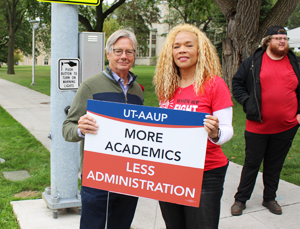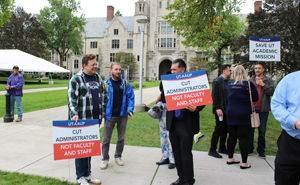
The Truth Staff
For only the second time in the 30-year history of the UT-AAUP (University of Toledo – American Association of University Professors), members walked the picket line in front of the institution’s University Hall on Wednesday, September 27. Last week’s action was taken to protest the proposal from Matt Schroeder, executive vice president of Finance, to cut another $17 million from all UT colleges’ budgets, except the medical school.
The union’s argument with the administration’s plan is that the brunt of the cuts will focus on the academic side of the institution – the faculty and staff – while the administration side will barely be cut even though the UT academic budget (general fund) is less than half the total UT budget, according to Tim Brakel, president of the UT-AAUP.
UT President Dr. Greg Postel has announced that “58 academic programs have been cut with more to come,” noted Brakel in his letter to the president last week.
However, “the UT faculty payroll and benefits (not including members of the medical school) is less than 15% of the academic budget,” Brakel wrote as well, while “the administration’s budge is over 40% of the academic budget, almost three times the faculty.”
 The projected cuts to faculty and staff follow some already drastic reductions on the academic side, wrote Brakel. He observed that Dr. Postel and Schroeder “announced administrative cuts of $12 million versus academic cuts of $16 million in 2022.” Since that time the number of faculty members has dropped from 625 to its current level of 550 along with cuts to part-time and visiting faculty.
The projected cuts to faculty and staff follow some already drastic reductions on the academic side, wrote Brakel. He observed that Dr. Postel and Schroeder “announced administrative cuts of $12 million versus academic cuts of $16 million in 2022.” Since that time the number of faculty members has dropped from 625 to its current level of 550 along with cuts to part-time and visiting faculty.
Brakel expressed his belief that the cuts will ultimately impact the future of the university by reducing the appeal for prospective students.
“Given that faculty and benefits represent such a small percentage of the total budget, this latest round of Schroeder’s proposed cuts is not so much about cutting expenses, as it is about threatening faculty, the ones who produce the tuition revenue. The only thing this proposal will cut is recruitment and retention, as students enroll in institutions that respect their faculty and provide stable program schedules.”
Brakel’s comments were echoed by Erika White, president of the CWA (Communications Workers of America), who joined university faculty, staff and students on the picket line. White, a graduate of UT who also has a daughter currently attending the university, also spoke of what she feels is a disturbing trend to make cuts on the academic side.
 “There have been many cuts over the last several years that have impacted students and how we can best serve them,” she said. “If we’re not getting quality professors, we can’t get students.”
“There have been many cuts over the last several years that have impacted students and how we can best serve them,” she said. “If we’re not getting quality professors, we can’t get students.”
White addressed the benefit that UT brings to the neighborhood around the campus and Toledo as a whole. “We forget what UT does for us – UT sustains the neighborhood.”
The CWA provides staff to the university and, according to Brakel, Schroeder’s plan will greatly impact staffing levels. “All of the colleges have cut staff to the bone with some colleges having a single secretary responsible for 2 or 3 departments. The average staff pay is about $45,000 for 12 months. Many earn less because of cuts in their hours. The low-paid CWA staff have been our front-line student-friendly ambassadors in contact with students who come to a department office at all hours of the day looking for assistance … What damage has been done to student success?”
 The University of Toledo’s Board of Trustees passed the 2023-2024 budget this past summer with reductions of seven percent totaling $21.8 million in cuts, slashing jobs and programs. Postel justified the cuts at that time by noting that the university has suffered a decade of declining enrollment, hurting the school financially and requiring hard choices.
The University of Toledo’s Board of Trustees passed the 2023-2024 budget this past summer with reductions of seven percent totaling $21.8 million in cuts, slashing jobs and programs. Postel justified the cuts at that time by noting that the university has suffered a decade of declining enrollment, hurting the school financially and requiring hard choices.
The region’s demographics, Postel said, reflect a declining population, fewer students graduating from high school and more competition for colleges.
UT-AAUP has been negotiating for over a year with the university but many issues remain unresolved; the contract with CWA expires at the end of 2023 and AFSCME expects to start negotiations in February 2024.
